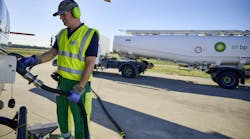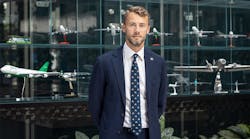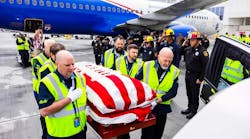Embry-Riddle Aeronautical University will reach a proud milestone this month when eight students will be the first to graduate from Embry-Riddle’s first-ever Ph.D. programs launched in 2010. Ranging in age from 26 to 57, five of the students earned a Ph.D. in Aviation and three earned a Ph.D. in Engineering Physics.
Both programs were created to satisfy the demand for research skills that enable professionals in a variety of positions to approach problems in a more scientific manner, have a greater impact on their industry and advance in their careers.
“We are proud of the high level of research that our Ph.D. students have performed,” said Dr. Richard Heist, chief academic officer of the university’s Daytona Beach Campus, where the Ph.D. in Engineering Physics is offered. “They chose dissertation topics that either added to the body of knowledge of their discipline or that directly related to the solution of real-world challenges in the aviation, aerospace and engineering industries.”
Ph.D. in Aviation
Embry-Riddle’s Ph.D. in Aviation is the first of its kind in the nation. Degree seekers can choose one of three specializations: Aviation Safety & Human Factors, Operations or Intradisciplinary. The degree program is delivered primarily online at this time but may be offered at one of the university’s residential campuses in Daytona Beach or Prescott in the future.
The following individuals have earned the Ph.D. in Aviation:
Dr. Carolina Anderson studied the effects of aircraft certification rules on general aviation accidents in her dissertation. She joined Embry-Riddle’s Flight Department in 2000, becoming a flight instructor, standards check pilot and training manager. Dr. Anderson is now an assistant professor of aeronautical science at the university’s Daytona Beach Campus.
Dr. David Freiwald examined the impact of an immediate supervisor’s ethical leadership and organizational safety culture on rates of occupational injuries. He was director of safety for a multinational flight training organization before joining Embry-Riddle, where he is now an assistant professor of aerospace and occupational safety at the Daytona Beach Campus.
Dr. Benjamin “B.J.” Goodheart focused on the prediction of runway incursion risk, assisted by funding from the Transportation Research Board. He is the director of aviation safety and claims management for AirSure Limited and teaches aviation safety online for Embry-Riddle’s Worldwide Campus.
Dr. Robert “Buck” Joslin assessed the latest technology that alerts pilots when two aircraft are on the same runway. He was previously a colonel in the U.S. Marine Corps and a military/FAA test pilot. He is now the FAA’s chief scientific and technical advisor for flight deck technology as well as an adjunct instructor of aerodynamics for Embry-Riddle’s Worldwide Campus at Marine Corps Base Camp Pendleton, Calif.
Dr. William Tuccio used his dissertation to test a low-cost method for novice pilots to learn crew resource management skills. A former computer programmer and airline captain, he now works for the National Transportation Safety Board as an aerospace engineer in the Vehicle Recorders Division of the Office of Research & Engineering.
Ph.D. in Engineering Physics
This Ph.D. program blends theoretical physics with practical engineering applications and problem-solving with a focus on space. It builds on Embry-Riddle’s undergraduate and master’s degrees in Engineering Physics and on the university’s solid program of space research funded by NASA, the National Science Foundation and the U.S. Air Force, among others. It is currently offered at the Daytona Beach Campus.
The following individuals have earned the Ph.D. in Engineering Physics:
Dr. William Price studied the application of nonlinear control methods to dual quaternion systems, which provide a novel mathematical approach for modeling rigid body motion. Formerly he was a navigator and operations officer on the Navy submarine USS Henry M. Jackson. Dr. Price is now an adjunct instructor in the Physical Sciences Department at Embry-Riddle’s Daytona Beach Campus.
Dr. Jaime Rubio Hervas examined the dynamics and control of systems with velocity and acceleration constraints, showing their application in such examples as spacecraft attitude control. His dissertation resulted in around 20 peer-reviewed journal publications and conference proceedings. Currently he is working on landing systems for unpiloted aircraft with his Embry-Riddle Ph.D. advisor, Dr. Mahmut Reyhanoglu, as a research fellow at Nanyang Technological University in Singapore.
Dr. Chau Ton focused on the design of robust control methods for systems that contain uncertainties in the dynamic model. He was a graduate teaching assistant at Embry-Riddle while earning his Ph.D. and now holds a postdoctoral position at the University of Florida’s Research Engineering & Education Facility.
About Embry-Riddle
Embry-Riddle Aeronautical University, the world’s largest, fully accredited university specializing in aviation and aerospace, is a nonprofit, independent institution offering more than 40 baccalaureate, master’s and Ph.D. degree programs in its colleges of Arts and Sciences, Aviation, Business and Engineering. Embry-Riddle educates students at residential campuses in Daytona Beach, Fla., and Prescott, Ariz., and through the Worldwide Campus with more than 150 locations in the United States, Europe, Asia and the Middle East. The university is a major research center, seeking solutions to real-world problems in partnership with the aerospace industry, other universities and government agencies. For more information, visit www.embryriddle.edu, follow us on Twitter (@EmbryRiddle) and www.facebook.com/EmbryRiddleUniversity, and find expert videos at YouTube.com/EmbryRiddleUniv.


